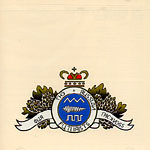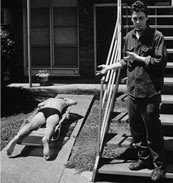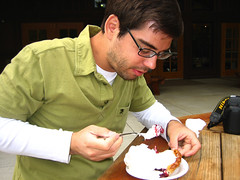Here is an update story from the
Memphis Flyer's "Music Issue" concerning the fire that broke out at the Easley-McCain Studio. Includes interviews with partners Doug Easley and Davis McCain as well as engineer extraordinaire, Kevin Cubbins. Story by
Andrew Earles.
Damage Done
Sorting through aftermath of the Easley-McCain Studio fire.
The birthplace of several important alt-rock records (most recently the White Stripes' White Blood Cells) and a key component in the creative matrix that drives Memphis' Midtown-based indie-rock scene, Easley-McCain Recording Studio, located at 2272 Deadrick Avenue, was dealt a horrible blow when a blaze wiped out the studio's control room, waiting area, and sections of the second floor, which was being used for storage and a smaller studio area.
The March 2nd fire, discovered by engineer Kevin Cubbins, spared the tracking room (or "big room"). The door was closed, and the wall that separates this room from the remainder of the studio acted as a firewall. The cause of the fire hasn't been determined, but investigators have narrowed its origin to the area of a wastebasket and electrical outlet. "I don't know, and I don't think they really know yet," says studio owner Doug Easley. "It wasn't arson. Use that as your big quote. It wasn't arson."
Little compares to the despair of watching something close to you burn uncontrollably, but an adage holds true: It could have been worse. "It's only equipment. People aren't replaceable. I'd much rather go to a storage unit than go to a bunch of funerals," Easley says.
"We're sorting out what was burned and destroyed and what was burned and can be cleaned or salvaged," says Davis McCain, Easley's longtime partner. "Unfortunately, the destroyed pile is getting bigger."
But six weeks later, Easley and McCain aren't just sorting through the damage. They're also sorting through the ramifications of insurance negotiations.
"It's amazing how little communication goes on [with insurance companies]. As long as they can hold onto their money, they're happy," Easley says.
The process isn't helped by the enormous amount of work required to catalog the damage, a process that has required equipment dealers to help value some of the studio's more esoteric items.
"Every piece is a line on a form, then there is a value that you have to give it,
and then [the insurance company] wants to know where you got that number," Easley says.
"We're just digging out from under this incredible mound of charred stuff. If the process seemed slow at the beginning, it's really slow now," McCain adds.
Despite the damage, work continues for Easley-McCain. Some remote work is taking place. For instance, Cubbins headed up to a rented cabin in Arkansas last week to finish an album with local band the Glass, a project that began at Easley-McCain. And Easley makes clear that, whatever the impact on the studio itself, the fire has also had an impact on local musicians now short a recording outlet.
"People are always saying, 'Let's do benefits.' It's a nice gesture, but there's no way to know right now what they would be funding," McCain says.
"I thought we should have a reverse benefit. Everybody who ever came
to the studio, they'd come to a show, and they'd get $5 at the door and free beer," Easley adds. "We always tried to make it an all-inclusive thing, where people went to have a good time and where a lot of great things emanated from. In retrospect, it's been a great run for us, but we didn't do it by ourselves."
The studio's future is still in flux, pending the slow process of sorting out damages and insurance claims. At present, Easley and McCain are pricing rooms for temporary rental and ferreting out locations for in-progress projects. "I've been looking for places to continue some projects I had going," Easley says. "Though it's premature to say exactly what, we are continuing in one form or another. I'm not retiring."
•
By
Andrew Earles


